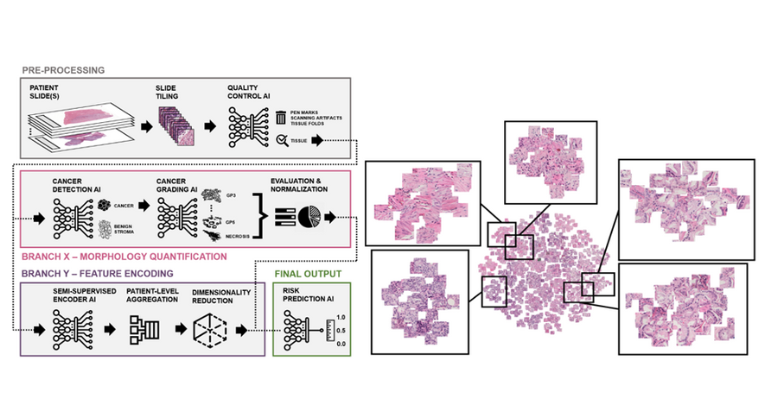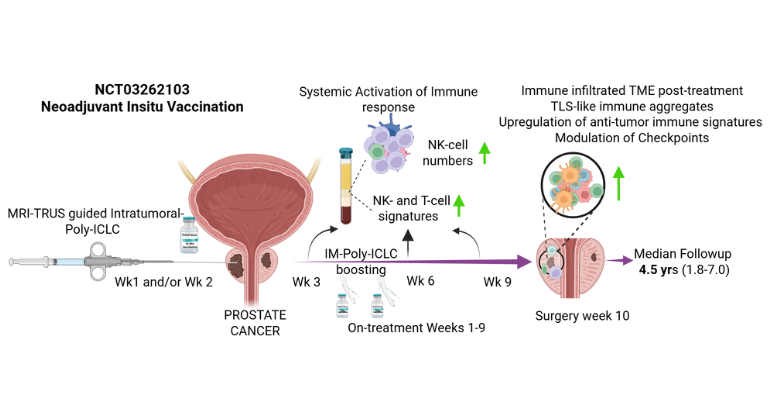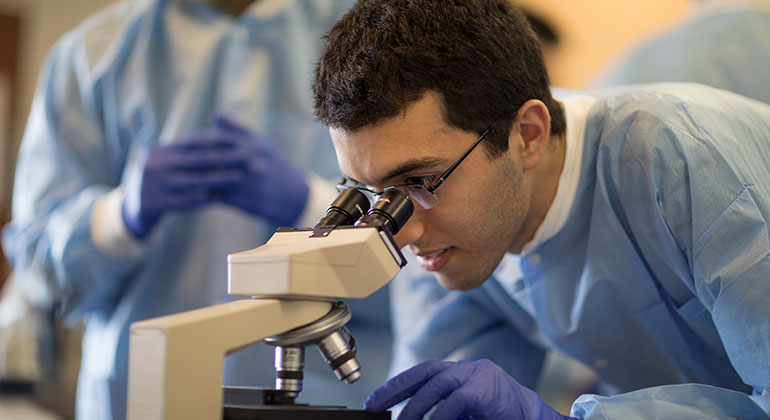New AI Tool by Mount Sinai Researchers Could Reshape Prostate Cancer Care

The figure on the left provides a schematic overview of the Pathomiq_PRAD AI pipeline, including the pre-processing steps and deep learning algorithms used for morphology quantification and risk-score prediction. Figure on right shows a cluster map of different prostate cancer patterns detected by the AI tool PATHOMIQ_PRAD from stained tissue images. The boxes highlight close-up views of various tissue structures in the cancer and surrounding area. Nair, et al. (2024). A novel artificial intelligence–powered tool for precise risk stratification of prostate cancer progression in patients with clinical intermediate risk. European Urology https://doi.org/10.1016/j.eururo.2024.07.013
Researchers at the Icahn School of Medicine at Mount Sinai have developed an advanced artificial intelligence (AI)-driven tool to improve the management and prognosis of prostate cancer. Details on the findings were reported in the September 20 online issue of European Urology [https://doi.org/10.1016/j.eururo.2024.07.013].
Recent progress in AI, especially with advances in deep learning techniques, has accelerated the creation of new technologies that use medical images to predict diseases more accurately.
The tool, PATHOMIQ_PRAD, designed for patients with intermediate-risk prostate cancer, uses deep learning to extract morphological features from datasets derived from biopsy or surgical hematoxylin- and eosin-stained whole-slide images. It aims to identify those at higher risk of rapid disease progression and provide more timely, accurate predictions for earlier interventions and more targeted, personalized, treatment plans. Estimates for prostate cancer in the United States for 2024 are about 299,010 new cases, with about 35,250 deaths.
“About 60 percent of patients in the intermediate-risk group don’t have a clear treatment plan, and around 30 to 50 percent see their cancer progress after the first round of therapy. We’re finding that some of these patients are at higher risk for rapid progression, so identifying them early is critical,” says co-corresponding author Ash Tewari, MD, MBBS, MCh, Kyung Hyun Kim, MD Professor and Chair of the Milton and Carroll Petrie Department of Urology at Icahn Mount Sinai. “We developed this tool to analyze samples from biopsies or surgeries, providing a clearer understanding of which patients may require more aggressive treatment earlier to improve their outcomes. PATHOMIQ_PRAD has the potential to become a routine part of clinical decision-making.”
PATHOMIQ_PRAD scores range from 0 to 1, with higher scores indicating high-risk features. The study analyzed large datasets to classify patients into high- and low-risk groups using pre-determined PATHOMIQ_PRAD clinical cut offs of 0.45 for BCR and 0.55 for metastasis. These limits were based on things like the chances of cancer returning or spreading. The study found that the tool outperformed existing benchmark cancer outcomes over the next five years compared to other current tools.
“One key advantage of the tool is its ability to analyze specific regions of tissue that may hold clues to previously undiscovered drivers of prostate cancer progression. This insight could potentially lead to advancements in understanding racial disparities in prostate cancer outcomes, helping us explore why certain populations face more aggressive disease,” says co-corresponding author Sujit S. Nair, PhD, Assistant Professor and Director of GU Immunotherapy Research in the Department of Urology at Icahn Mount Sinai. “These developments are exciting, and we are working toward further validation studies.”
The Icahn Mount Sinai researchers worked in collaboration with PATHOMIQ INC., based in Cupertino, California, to develop PATHOMIQ_PRAD. Next, the researchers plan to conduct large-scale clinical validation studies with a more diverse patient population. They also aim to pursue regulatory approval to develop PATHOMIQ_PRAD as a Lab Developed Test, allowing its use in CLIA-certified labs. Additionally, the Icahn Mount Sinai and PATHOMIQ teams are integrating the tool with advanced genomic profiling techniques, such as spatial transcriptomics and mass cytometry, to enhance understanding of the biology behind the regions identified by PATHOMIQ_PRAD.
“Our study pioneers an innovative design, and we’re thrilled about the AI tool’s potential to transform risk stratification for prostate cancer patients, paving the way for future advances,” says Rachel Brody, MD, PhD, Professor of Pathology, Molecular and Cell-Based Medicine at Icahn Mount Sinai and a co-author of the study.
“This study highlights the clinical potential of this innovative AI tool, which uses digitized whole-slide images to transform prostate cancer of Urology at Icahn Mount Sinai. “Ours is the first AI tool designed for intermediate-risk prostate management. By analyzing various tissue types—epithelial, stromal, and immune cells—it generates a detailed score for each patient, predicting outcomes and offering a powerful new way to guide treatment decisions,” says co-corresponding author Dimple Chakravarty, PhD, Assistant Professor of Urology at Icahn Mount Sinai. “Ours is the first AI tool designed specifically for intermediate-risk prostate cancer patients that is both scalable and generalizable. It can be used for risk stratification from biopsy and surgery specimens. It’s affordable, quick, and adaptable for use in various health care settings.
The paper is titled “A Novel Artificial Intelligence–powered Tool for Precise Risk Stratification of Prostate Cancer Progression in Patients with Clinical Intermediate Risk.”
To view details on the remaining authors and competing interests, see: https://doi.org/10.1016/j.eururo.2024.07.013
About the Icahn School of Medicine at Mount Sinai
The Icahn School of Medicine at Mount Sinai is internationally renowned for its outstanding research, educational, and clinical care programs. It is the sole academic partner for the eight- member hospitals* of the Mount Sinai Health System, one of the largest academic health systems in the United States, providing care to a large and diverse patient population.
Ranked 13th nationwide in National Institutes of Health (NIH) funding and among the 99th percentile in research dollars per investigator according to the Association of American Medical Colleges, Icahn Mount Sinai has a talented, productive, and successful faculty. More than 3,000 full-time scientists, educators, and clinicians work within and across 44 academic departments and 36 multidisciplinary institutes, a structure that facilitates tremendous collaboration and synergy. Our emphasis on translational research and therapeutics is evident in such diverse areas as genomics/big data, virology, neuroscience, cardiology, geriatrics, as well as gastrointestinal and liver diseases.
Icahn Mount Sinai offers highly competitive MD, PhD, and Master’s degree programs, with current enrollment of approximately 1,300 students. It has the largest graduate medical education program in the country, with more than 2,000 clinical residents and fellows training throughout the Health System. In addition, more than 550 postdoctoral research fellows are in training within the Health System.
A culture of innovation and discovery permeates every Icahn Mount Sinai program. Mount Sinai’s technology transfer office, one of the largest in the country, partners with faculty and trainees to pursue optimal commercialization of intellectual property to ensure that Mount Sinai discoveries and innovations translate into healthcare products and services that benefit the public.
Icahn Mount Sinai’s commitment to breakthrough science and clinical care is enhanced by academic affiliations that supplement and complement the School’s programs.
Through the Mount Sinai Innovation Partners (MSIP), the Health System facilitates the real-world application and commercialization of medical breakthroughs made at Mount Sinai. Additionally, MSIP develops research partnerships with industry leaders such as Merck & Co., AstraZeneca, Novo Nordisk, and others.
The Icahn School of Medicine at Mount Sinai is located in New York City on the border between the Upper East Side and East Harlem, and classroom teaching takes place on a campus facing Central Park. Icahn Mount Sinai’s location offers many opportunities to interact with and care for diverse communities. Learning extends well beyond the borders of our physical campus, to the eight hospitals of the Mount Sinai Health System, our academic affiliates, and globally.
-------------------------------------------------------
Mount Sinai Health System member hospitals: The Mount Sinai Hospital; Mount Sinai Beth Israel; Mount Sinai Brooklyn; Mount Sinai Morningside; Mount Sinai Queens; Mount Sinai South Nassau; Mount Sinai West; and New York Eye and Ear Infirmary of Mount Sinai.
About the Mount Sinai Health System
Mount Sinai Health System is one of the largest academic medical systems in the New York metro area, with 48,000 employees working across seven hospitals, more than 400 outpatient practices, more than 600 research and clinical labs, a school of nursing, and a leading school of medicine and graduate education. Mount Sinai advances health for all people, everywhere, by taking on the most complex health care challenges of our time—discovering and applying new scientific learning and knowledge; developing safer, more effective treatments; educating the next generation of medical leaders and innovators; and supporting local communities by delivering high-quality care to all who need it.
Through the integration of its hospitals, labs, and schools, Mount Sinai offers comprehensive health care solutions from birth through geriatrics, leveraging innovative approaches such as artificial intelligence and informatics while keeping patients’ medical and emotional needs at the center of all treatment. The Health System includes approximately 9,000 primary and specialty care physicians and 10 free-standing joint-venture centers throughout the five boroughs of New York City, Westchester, Long Island, and Florida. Hospitals within the System are consistently ranked by Newsweek’s® “The World’s Best Smart Hospitals, Best in State Hospitals, World Best Hospitals and Best Specialty Hospitals” and by U.S. News & World Report's® “Best Hospitals” and “Best Children’s Hospitals.” The Mount Sinai Hospital is on the U.S. News & World Report® “Best Hospitals” Honor Roll for 2025-2026.
For more information, visit https://www.mountsinai.org or find Mount Sinai on Facebook, Instagram, LinkedIn, X, and YouTube.

Early Clinical Trial Tests Immune-Boosting Therapy Before Prostate Cancer Surgery
Oct 30, 2025 View All Press Releases
